SCO summit: Victims of terrorism don't sit with perpetrators, says EAM
Both nations should sit together on terrorism: Bilawal Bhutto Zardari during first visit to India by a Pak FM in a decade
)
Photo: @DrSJaishankar
In a strong rebuttal to vising Pakistan Foreign Minister Bilawal Bhutto Zardari’s suggestions that both nations should sit down to discuss the issue of terrorism, External Affairs Minister S Jaishankar said India had been a victim of Pakistan-sponsored terrorism and will not engage in discussions on the issue with the very country responsible for it.
“Victims of terrorism do not sit together with perpetrators of terrorism. They defend themselves, counter acts of terrorism, call it out and deligitimise it, and that is what will happen,” Jaishankar said, while addressing the media on the sidelines of the first foreign ministers’ meeting of the Shanghai Cooperation Organization (SCO) in Goa.
On Friday morning, a blast triggered by terrorists in Jammu and Kashmir’s Rajouri district killed at least five Army personnel and left several injured.
In a press conference with the Pakistani media, Zardari had stressed earlier in the day that Pakistan itself has been affected by terrorism, and that taking eyes off terrorism would be detrimental to the security interests of the grouping. “To come here, and preach these hypocritical words as though we are in the same boat… I mean, they are committing acts of terrorism,” Jaishankar said.
Zardari is the first senior leader from the neighbouring country to visit India in almost 12 years. In 2011, Pakistan’s then foreign minister Hina Rabbani Khar had visited India to hold talks with then external affairs minister SM Krishna. No bilateral meeting took place between Zardari and Jaishankar at the 2-day SCO event.
Also Read
Jaishankar rebuffed questions by the Pakistani media on whether Zardari’s visit represented a breakthrough in bilateral relations. “As the foreign minister of an SCO member state, Mr. Bhutto Zardari was treated accordingly. As the promoter, justifier and I’m sorry to say, as a spokesperson of as a terrorism industry, which is the mainstay of Pakistan, his positions were called out and were countered, including at the SCO meeting itself,” he said.
India on Friday urged all SCO members to focus on stopping terrorism in all its forms, including cross-border terrorism, in an apparent reference to Pakistan at the SCO Foreign Ministers Meet in Goa.
Combating terrorism has been a key agenda at the 2-day meet, which was also attended by Chinese Foreign Minister Qin Gang and Russia’s Sergey Lavrov. In his address to the grouping, Jaishankar asserted the menace must be eradicated, and that channel of finances for terrorist activities must be blocked without any distinction.
Zardari had said the SCO countries should not get caught up in “weaponising terrorism for diplomatic point scoring”. Jaishankar retorted that this reflected the mindset of the Pakistani administration, which views terrorism as a normal fact of life.
“Don't know if peace is a destiny, but terrorism can’t be one," Jaishankar said to Zardari’s comments on peace being a destiny of both nations.
Territorial sovereignty
Zardari had said India’s decision to end the special status of Jammu & Kashmir has undermined the environment for holding Pakistan-India talks. In August 2019, India announced withdrawing special powers of Jammu and Kashmir and bifurcation of the state into two Union Territories.
Jaishankar said Jammu & Kashmir “was, is, and will always be a part of India”, and Islamabad’s reservations with G20 meetings in the territory can’t be debated with a country which is not a G20 member.
On the China-Pakistan Economic Corridor, it was made very clear to the minister in the SCO meeting that connectivity can’t violate the territorial integrity and sovereignty of states, he said.
Jaishankar said India and China also needed to disengage at the northern borders in Ladakh. “India, China relations are not normal, and cannot be normal until peace and tranquillity at the border areas is restored,” he stressed.
Eyes on SCO
SCO is a political, economic, and security alliance of eight nations, historically led by Russia and China. It is considered the most important conclave in the Central Asian region, where other nations have a significant interest in trade, connectivity, and resource extraction. The SCO comprises nine countries: China, India, Iran, Kazakhstan, Kyrgyzstan, Pakistan, Russia, Tajikistan, and Uzbekistan.
At the latest meet, the expansion and reform of the organisation was also on the agenda. The members assessed the accession of Iran and Belarus. India also sought the support of members to make English the third official language of SCO, beside the currently used Russian and Mandarin.
Founded in 2001 by the Central Asian nations and Russia, India and Pakistan became its permanent members in 2017. India assumed the rotational annual presidency of the SCO last year — only the sixth summit India participates in as a full-fledged member.
The latest meet also set the agenda for the upcoming SCO Summit to be held by India in July. Before it holds the SCO summit on June 25 in Delhi, the government has held more than a hundred meetings and events in India, including 15 ministerial-level and head of agency-levels which were held for the first time, Jaishankar said.
New Delhi has championed the creation of new verticals of cooperation in the grouping, such as start-ups and innovation, science and technology, traditional medicine and empowering the youth. It has also focused on reviving the countries’ “shared Buddhist heritage”, and sought to promote tourism in many places in Bihar and Uttar Pradesh associated with Buddhism.
More From This Section
Don't miss the most important news and views of the day. Get them on our Telegram channel
First Published: May 05 2023 | 8:51 PM IST
